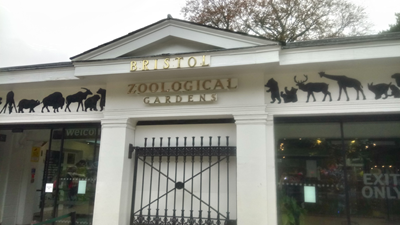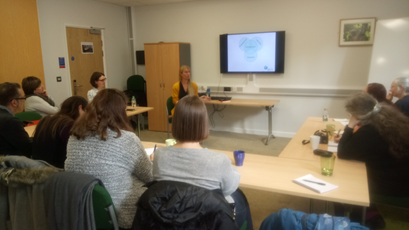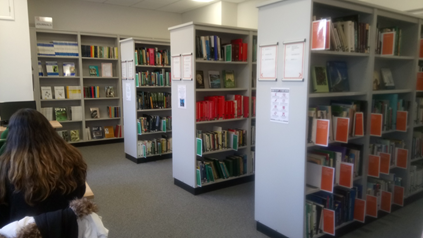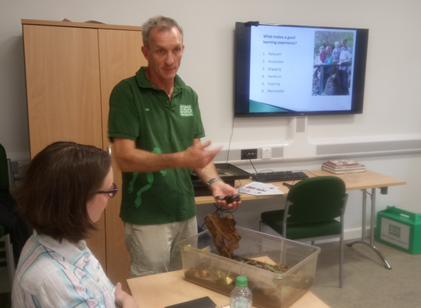A group of 11 of us met up for the visit organised by Valerie Bearne, Retired Members Liaison for CILIP SW. Siobhan Klaus, Librarian/Administrator took us over to the Conservation Education Centre. The Centre has two parts; education facilities for schools and college visits and a Higher Education Campus. I had expected facilities for school visits but not the higher education role of the zoo and therefore the large role that the library has for this. An unusual extra to the normal housekeeping introduction was what to do if an animal escaped!
Our first session of the day was an overview of conservation, the HE teaching programmes and field research with Dr Daphne Kerhoas, Lecturer in Conservation Science. We are used to the ever changing field of library and information and it was interesting to hear this is also happening for zoos. She explained that the approach to conservation is changing from the original focus on species conservation to ecosystem conservation. This includes reaching out to people to try and get them to change their habits. The zoo is now a more immersive experience with people entering the animal enclosures. Entering the ecosystem of the wildlife should encourage people to care more about wildlife. Bristol Zoo is involved in conservation research and projects across Britain and around the world. The projects try to address problems by involving the local population and finding solutions that help both them and the wildlife.
Bristol Zoo offers a range of Foundation, BSc and Masters conservation degrees in collaboration with the University of the West of England (UWE), the University of Bristol and the University of Gloucester and South Gloucestershire and Stroud College (SGS). The facilities include 2 lecture rooms seating 70 and 120, seminar and classrooms, library and laboratory. It is part of the Librarian/Administrator role to book the rooms for the courses. She also teaches in the level one module ‘Professional Work Skills’ and level two module ‘Research and Work Skills’. Lecturers also signpost students to her for help as she is the most accessible member of staff; the lecturers’ offices are further away and only accessible by bell.
The next session was with Siobhan Klaus, Librarian and Administrator. The present library is in the Conservation Education Centre built in 2015. It is staffed by one full time librarian, a volunteer one afternoon per week and 2 research students. The library has 4,500 books and 2,500 journals. The main users of the library are the 300 students, but staff, volunteers and visiting researchers also use the library. I found the cataloguing system intriguing. The books are catalogued by letters then a number eg. Ec-H-W number = Ecology – Habitat – Woodland + next number of when added. The large BBC Wildlife collection has been donated to the zoo. It had been catalogued using the ZSL (Zoological Society of London) classification, so some books have both labels. Some of the physical stock is purchased and owned by SGS whereas UWE purchases eCopies for their students. The librarian meets partner librarians 2/3 times a year. She also attends monthly department meetings and asks for suggestions for purchase.
The advantages that the librarian finds of working at the zoo library are that the collection is quirky, historic and important. The challenges are that it is a balancing act being the administrator for HE in addition to being a librarian, it is mainly lone working and the budget is small but academic texts are very expensive. The Bristol Zoo Archive is now stored at the Bristol Archives and some is in store at the Pavilion at the zoo. It is not catalogued apart from being grouped by a couple of PHD students. The next challenge is to catalogue and digitise the archive to make it accessible. Bristol Zoo is fundraising with Bristol Archives to achieve this.
The last session was with Dave Naish, Education Manager. In 1981 the Zoo Licensing Act specified conservation and education as requirements to be licensed as a zoo. In 2015 the Secretary of State’s Standards for Zoo Practice went further to include to stimulate pro-environmental behaviours. Bristol Zoo employs a psychologist on the team to advise on campaigns and projects to encourage behaviour change. The informal learning is supported by the rangers, volunteers and a variety of signage around the zoo to appeal to the different types of visitors eg explorers, facilitators, professional/hobbyists, etc. There are interactive exhibits round the zoo and the Zoo Olympic trail of 10 stations where children can compare themselves to animals.
40,000 children per year receive formal learning at the Conservation Education Centre. The themed classrooms, such as the rainforest classroom, are designed to feel completely different from school. A good learning experience should be relevant, accessible, engaging, hands-on, inspiring and memorable. Dave then demonstrated this using the handling of Madagascan hissing cockroaches, a boa snake and items seized by customs. The session was accessible to people whatever their learning style, eg visual, aural, physical, etc. The centre started adult evening classes 3 years ago to let people find out about behind the scenes. The classes have experts from different parts of the zoo eg vets taking sessions and also live animals at the classes, so increasing the connection of people to wildlife and conservation.
We then had a chance to explore the zoo and see the immersive experience in practice. We all enjoyed this very interesting and informative visit.



